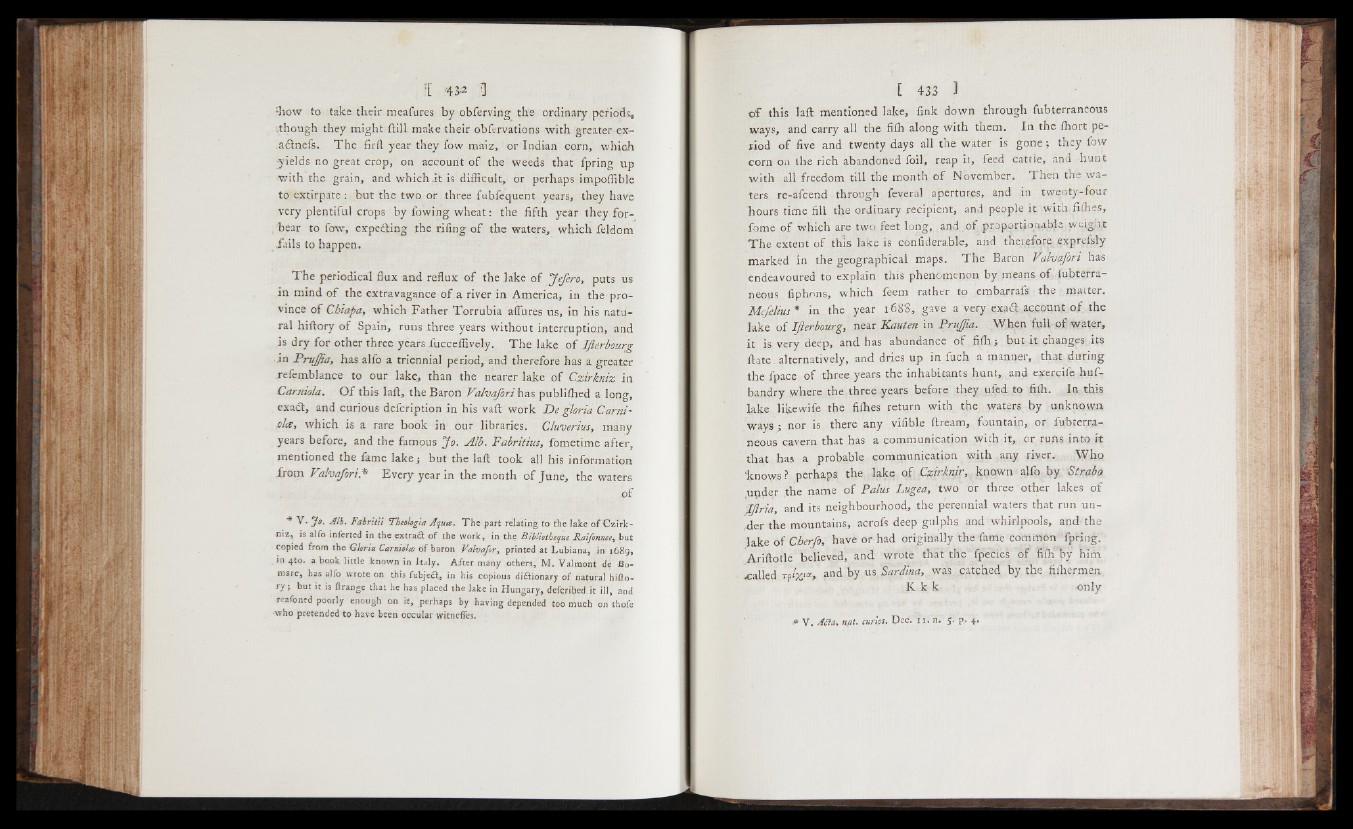
;how to take their meafures by obferving the ordinary periods,
•¿though they might Hill make their obfervations with greater ex-
.adtnefs. The firll year they fow maiz, or Indian corn, which
fie ld s no great crop, on account o f the weeds that fpring np
with the grain, and which i t is difficult, or perhaps impoffible
to extirpate : but the two or three fubfequent years, they have
very plentiful crops by fowing wheat : the fifth year they forbear
to fow, expediting the riling of the waters, which feldom
Tails to happen.
The periodical flux and reflux o f the lake o f Refera, puts us
in mind o f the extravagance o f a river in America, in the province
o f Chiapa, which Father Torrubia allures us, in his natural
hiftory o f Spain, runs three years without interruption, and
js dry for other three years fucceffively. The lake o f IJierbourg
in Prujjia, has alfo a triennial period, and therefore has a greater
refenablance to our lake, than the nearer lake o f Czirkniz in
Carniola. O f this lalt, the Baron Vaioafori has publilhed a long,
exact, and curious defcription in his vail work De gloria Car ni-
ela , which is a rare book in our libraries. Cluverius, many
years before, and the famous Jo. Alb. Fabritius, fometime after,
mentioned the lame lake; but the lalt took all his information
from Valvafori* Every year in the month o f June, the waters
o f
* V . Jo. AH. Fabritii Theologia Aqua. Th e part relating to the lake of C zirkniz,
is alfo inferted in the extradt of the work, in the Bibliothèque Raijonnee, but
copied from the Gloria Carniola of baron Valvafor, printed at Lubiana, in 1689,
in 4to. a book little known in Italy, After many others, M. Valmont de -Bo-
marc, has alfo wrote on this fubjedl, in his copious diflionary of natural hiftory
; but it is ft range that he has placed the lake in Hungary, defcribed it ill, and
reafoned poorly enough on it, perhaps by having depended too much on thofe
■who pretended to have been occular witnefles.
o f this laft mentioned lake, fink down through fubterraneous
ways, and carry all the filh along with them. In the ihort period
o f five and twenty days all the water is go ne ; they fow
corn on the rich abandoned foil, reap it, feed cattle, and hunt
with all freedom till the month o f November. Then the waters
re-afcend through feveral apertures, and in twenty-four
hours time fill the ordinary recipient, and people it with fifhes,
fome o f which are two feet long, and o f proportionable w eight
T h e extent of this lake is confiderable, and therefore exprefsly
marked in the geographical maps. The Baron Valvafori has
endeavoured to explain this phenomenon by means of fubterraneous
fiphnns, which feem rather to embarrafs the matter.
Mefelius * in the year 168$, gave a very exa£t,:,account o f the
lake of IJierbourg, near Kauten in Prujjia. When full o f water,
it is very deep, and has abundance of filh; but it changes its
Hate alternatively, and dries up in fuch a manner, that during
the fpace of three years the inhabitants hunt, and exercife huf-
bandry where the.three .years before they ufed to filh. In this
lake like wife the fifties return with the waters by unknown
ways ; nor is there any vifible ftream, fountain, or fubterraneous
cavern that has a communication with it, or runs into it
that has a probable communication with any river. Who
knows? perhaps the lake of C zirinir, known alfo by Strabo
upder the name of Palus Lugea, two or three other lakes o f
fjlr ia , and its neighbourhood, the perennial waters that run under
the mouotains, acrofs deep gulphs and whirlpools, and-the
lake of Cherfo, have or had originally the fame common fpring.
Ariftotle believed, and wrote that the fpediel of filh'by him
.called tJ x,“*, and by us Sardina, was patched by the filhermen
K k k ....... only
» V . Alla. not. curios. Dec. n . n. J. p. 4.